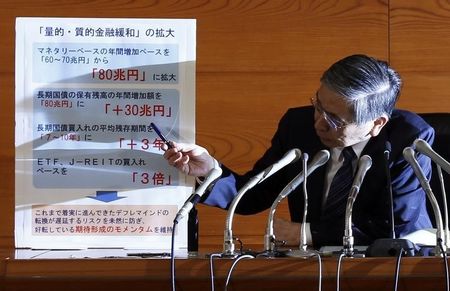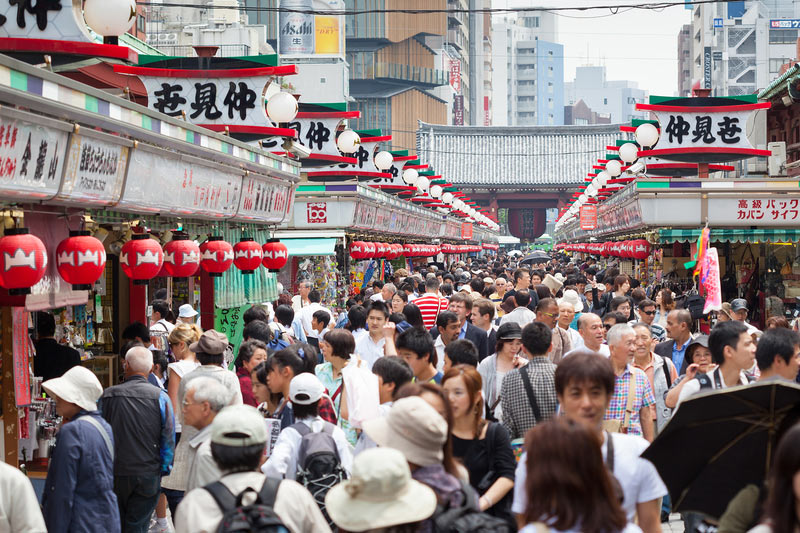By Lisa Twaronite and Stanley White TOKYO (Reuters) - Bank of Japan Governor Haruhiko Kuroda does not need to convince Japanese people like Kazue Shibata that deflation brings problems, but getting them to believe that higher prices will make things better is proving to be a harder sell.
Shibata, 65, who runs a small dress shop in central Tokyo, worries the BOJ's mission to hit a 2-percent inflation target could end up driving business away unless people also have more money in their pockets.
"If prices rise, people might not buy as much," she said, echoing a concern of many private-sector economists.
On Friday, Kuroda's BOJ doubled down on a high-stakes bet that the central bank can shake Japan's consumers from a defensive set of expectations hardened by a decade and a half of falling prices, lower incomes and stop-and-go growth.
"It's important for the BOJ to strongly commit to achieving its price target to get that price target firmly embedded in people's mindset," Kuroda said at a news conference on Friday, after the BOJ stunned markets with an unexpected expansion of its monetary stimulus program.
"It won't do much good in trying to shake off the public's deflation mindset if you just say inflation will reach 2 percent some day," Kuroda said.
At the core of Prime Minister Shinzo Abe's "Abenomics" agenda is the assumption that the outlook for sustained inflation will prompt consumers to anticipate rising prices, and that consumption will rise as a result.
That represents a sea change for a country used to deflation, where clinging to cash today meant greater buying power tomorrow, a set of expectations that has proven hard to shake a year-and-a-half into an unprecedented easing by the BOJ.
Japan's economy, which has been hit by four recessions since 2000, is now on track to grow just 0.5 percent in the year to March, according to a revised projection by the central bank.
Shibata, who has run a shop in Tokyo's Higashi Azabu neighborhood offering ready-to-wear attire and custom-made items for about three decades, has seen the pain from that kind of slow growth - and falling prices - on her business.
"The prices people were willing to pay for order-made clothes fell, until they were almost the same as ready-to-wear," said Shibata, sitting in a cushioned chair next to her sewing machine.
BEEN DOWN SO LONG
In announcing its program of expanded asset purchases, the BOJ stuck with projections that it could hit Kuroda's 2-percent inflation in the fiscal year beginning next April.
But Japan's annual core consumer inflation slowed for a second straight month in September, adding to scepticism among economists that goal is within reach.
Moreover, the UTokyo Daily Price Index, a gauge maintained by economists at the University of Tokyo that tracks point-of-sales data for as many as 200,000 food items and daily necessities, has trended downwards after a spike in spring linked to a hike in the sales tax. That means that the falling prices people see every day reinforce the kind of "deflation mindset" that Kuroda hopes to break.
Kaoru Sakai, 65, who runs a hair salon in Tokyo's Nakano district, did not raise prices even after the national sales tax was raised to 8 percent to 5 percent in April, worried the sticker shock could scare away business.
"The fact is that people don't feel confident about the future," Sakai said. "Our society and economy has tilted people toward lower-end options. For example, it's like people choosing to eat at fast-food places, or standing-only soba shops even when they could, realistically, eat at proper restaurants."
Unless Japanese people see real progress in solving fundamental problems, such as lack of wage growth, a shrinking manufacturing base, and an unsustainable welfare system, many might prefer the problem they know to the one Kuroda hopes will replace it.
Classical economics would argue that consumers should welcome deflation, because it increases their purchasing power, an argument some consumers echo.
"Deflation reflects the underlying economy. Our population is decreasing, production is low and we're not seeing innovation. We are losing power compared with other countries," said Yohei Tanaka, 33, an accountant in Tokyo, who said his salary has not risen since Abe took office in December 2012.
"I don't think this is the time to drive the economy to inflation. I don't think inflation is the end solution. Deflation, in a certain way, is good."
(story refiles to remove extraneous words 'era of' in fourth paragraph)

(Additional reporting by Mari Saito; Editing by Kevin Krolicki and Alex Richardson)
